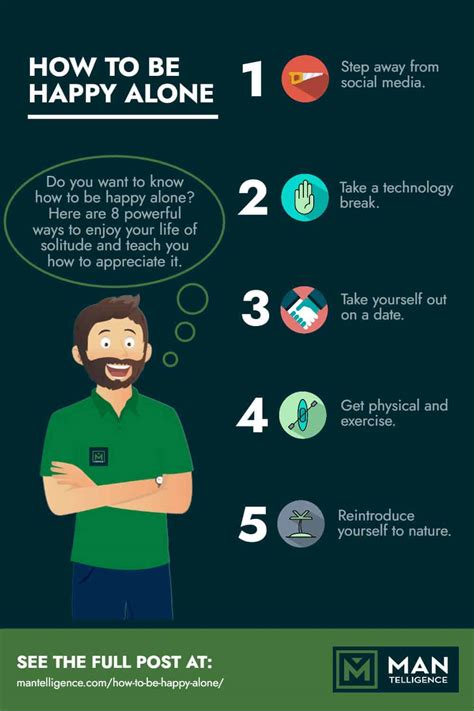Introduction

Loneliness can be a devastating feeling, making one feel isolated and disconnected from the world. However, it is important to remember that being alone does not equate to being lonely. In fact, many people find great joy and contentment in spending time by themselves. If you’re struggling to cope with the absence of friends, this comprehensive guide will provide you with actionable strategies to help you find happiness and fulfillment in solitude.
Understanding the Benefits of Being Alone
Embracing solitude can offer numerous benefits, including:
- Enhanced self-awareness: Spending time alone allows you to reflect on your thoughts, feelings, and goals without external distractions.
- Increased creativity: Solitude provides a safe space for introspection and idea generation, fostering creative thinking.
- Improved focus and productivity: Without the need to cater to others’ schedules and demands, you can concentrate on tasks that matter to you.
- Emotional resilience: Learning to be comfortable with your own company builds emotional strength and resilience in the face of challenges.
- Reduced stress and anxiety: Solitude can create a sense of calm and peace, reducing stress levels and promoting relaxation.
How to Step-By-Step Guide to Being Happy Alone
1. Embrace Solitude as an Opportunity for Growth
- Practice mindfulness: Pay attention to the present moment without judgment, observing your thoughts and feelings with curiosity.
- Engage in self-care activities: Prioritize activities that nourish your physical, mental, and emotional well-being, such as meditation, yoga, or reading.
- Set realistic goals: Identify personal goals that are meaningful and achievable, providing a sense of purpose and motivation.
2. Find Joy in Your Own Company
- Explore your interests: Rediscover forgotten hobbies or explore new activities that bring you pleasure, such as painting, writing, or learning a musical instrument.
- Embrace nature: Spend time outdoors surrounded by nature, connecting with the beauty and tranquility of the natural world.
- Practice gratitude: Foster a positive outlook by focusing on the things you have and appreciate, expressing gratitude for the good in your life.
3. Create a Meaningful Social Circle (If Desired)
- Cultivate existing relationships: Make an effort to maintain and strengthen connections with family, extended family, or previous acquaintances.
- Join groups or classes: Engage in activities that align with your interests and provide opportunities to meet new people.
- Consider professional support: If difficulties with loneliness persist, seek support from a licensed therapist or counselor who can provide coping mechanisms and support strategies.
Tables
| Table 1: Benefits of Solitude | Table 2: Self-Care Activities |
|---|---|
| Increased self-awareness | Meditation |
| Enhanced creativity | Yoga |
| Improved focus and productivity | Reading |
| Reduced stress and anxiety | Exercise |
| Emotional resilience | Healthy eating |
| Table 3: Activities to Find Joy in Solitude | Table 4: Ways to Create a Meaningful Social Circle |
|---|---|
| Painting | Join groups or classes |
| Writing | Cultivate existing relationships |
| Learning a musical instrument | Volunteer |
| Exploring nature | Attend social events |
| Practicing gratitude | Consider professional support |
Importance
Spending time alone is an essential skill for personal growth, resilience, and well-being. By embracing solitude, you can uncover your true passions, build self-reliance, and find happiness and fulfillment in your own company.
FAQs
-
Can I be happy without friends?
Yes, it is possible to be happy without friends. True happiness comes from within and can be found through self-care, pursuing your interests, and cultivating meaningful relationships with others (if desired). -
How do I overcome loneliness when I’m alone?
Practice mindfulness, engage in self-care activities, explore your interests, and consider seeking professional support if needed. -
What are the benefits of spending time alone?
Solitude offers numerous benefits, including increased self-awareness, enhanced creativity, improved focus and productivity, reduced stress and anxiety, and emotional resilience. -
How can I make being alone more enjoyable?
Set small, achievable goals, practice gratitude, engage in activities that bring you joy, and create a comfortable and inspiring environment for yourself. -
Is it healthy to be alone for extended periods?
While spending time alone can be beneficial, maintaining social connections is also important for overall mental and emotional well-being. -
Can I still have fun and be social without friends?
Yes, you can still enjoy social activities and connect with others by joining groups or classes, volunteering, attending social events, or cultivating relationships with family and extended family. -
What should I do if I feel isolated and alone?
Reach out to others, engage in self-care activities, seek professional support, and focus on being present and appreciating the good in your life. -
How can I develop a meaningful social circle?
Cultivate existing relationships, join groups or classes that align with your interests, and consider volunteering or attending social events.
